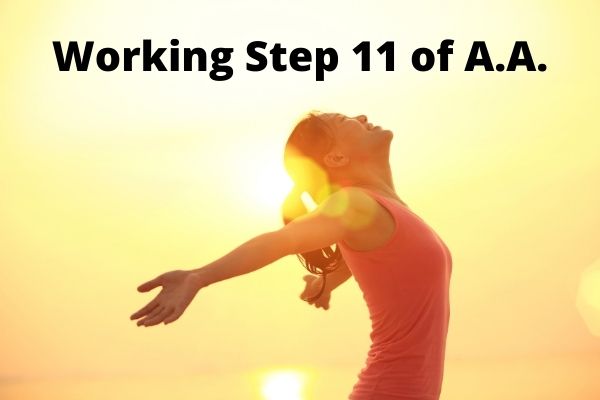Sought through prayer and meditation to improve our conscious contact with God as we understood Him, praying only for knowledge of His will for us and the power to carry that out.
Nearing the end of the Alcoholics Anonymous 12-Steps program we are now fully in future-mode and preparing ourselves to cement the positive changes we have undergone thus far. At first glance this step might seem quite passive, simply encouraging participants to pray and meditate to obtain “knowledge of His will”. Working Step 11 is unexpectedly multi-faceted, however. In addition to explaining the different objectives that meditation and prayer are meant to accomplish, this step highlights the importance of having the right mindset in your approach. Otherwise, your prayer and meditation could backfire, leading to recovery-impeding pitfalls.
What If I’m Not Religious?
Naturally, this step can seem quite challenging–or even impossible–for someone who is non-religious. Outwardly, completing this step seems to be almost entirely dependent on the acknowledgment of a formal God figure. However, as is the case with previous steps that have had a religious tone, you are encouraged to apply your own interpretation of God. Further, the fundamental principles of step eleven can still apply in non-religious reflection.
The Objective of Prayer & Meditation
Step 11 seems rather straightforward, but it is not as simple as meditation and prayer for the sake of getting something off your chest or strengthening your relationship with your higher power. The intention of prayer and meditation within the 12 Steps is to move away from worldly concerns and to realize our ideal selves. In the original text, this is referred to as the “spiritual objective” which serves as a goal to keep us on a positive track. Prayer and meditation are intended to help discover what this is for each individual.
The Difference Between Prayer and Meditation
These distinctions might not be relevant to secular individuals, but for those who are religious, it is helpful to understand the difference between these two acts. Step 11 denotes the unique intent and function of each type of spiritual outreach. Prayer is when one actively asks things of God (or your higher power). Meditation, on the other hand, is exploratory and introspective which is where our ideal selves (a.k.a. “spiritual objective”) are first envisioned.
Working Step 11: The Goal of Prayer
The biggest takeaway of this step isn’t to simply encourage regular participation in spiritual reflection. Step 11 provides a helpful guide and highlights the importance of going into these activities with a proper mindset. The initial instinct might be to reach out to a higher power seeking guidance on specific issues (i.e. What to do about a fight with your sibling) or to ask for specific things (i.e. Cure your friend diagnosed with cancer). This does virtually nothing for your personal growth. Instead, think big picture: Ask for qualities or traits (ex. understanding, patience, or compassion) that will help you live according to the principles of AA and will empower you to resolve your issues yourself.
Let’s use the above example about a person praying for help regarding a fight with their sibling. Rather than hoping for a resolution to be handed to them, it would much more constructive to ask for greater empathy (to better understand why she’s upset), grace (which might prevent future flaring of tempers, thus preventing arguments from occurring in the future), or perhaps even humility so that a person can apologize quickly and prevent disagreements from escalating in the first place.
Another danger of turning to prayer for help with micro-level problems is that you may unconsciously use it to rationalize your own wishful thinking. No matter how well-intentioned you may be, this “guidance” can be very self-serving. It can actually push you away from the Alcoholics Anonymous path. This is why step eleven emphasizes “will” and “knowledge”. Otherwise, the act of prayer and meditation would be little more than going through motions.
